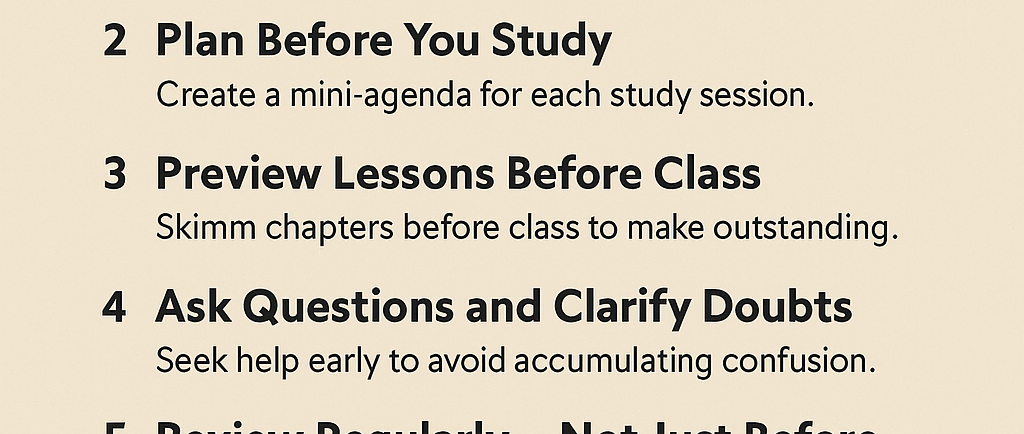How to Be Proactive in Studies: A Smarter Student’s Guide


In a world full of distractions and competition, being proactive in your studies is no longer optional — it’s essential. Proactive students don’t wait for deadlines or reminders. They take initiative, plan ahead, and stay one step ahead of the curriculum. Whether you’re in school, college, or preparing for a competitive exam, developing a proactive mindset can dramatically improve your academic performance.
🎯 1. Set Clear, Achievable Goals
Start by asking yourself: What do I want to achieve this week? Instead of vague intentions like “I will study more,” set specific targets like “I will finish Chapter 5 of Physics by Friday.” Break larger goals into smaller, manageable steps. Use a planner or digital app to track your weekly study goals. When you have a direction, it’s easier to take action.
📅 2. Plan Before You Study
A proactive student doesn’t sit down at a desk and wonder, “What should I do now?” Before each study session, create a mini-agenda: topics to cover, estimated time, and materials needed. Use techniques like the Pomodoro Method (25 minutes focused study, 5 minutes break) to maintain energy and avoid burnout.
📚 3. Preview Lessons Before Class
Want a secret to understanding lectures better? Skim the chapter before the teacher explains it. Even 15–20 minutes of previewing can make you more attentive in class, help you ask better questions, and retain information faster. It turns passive listening into active learning.
🤔 4. Ask Questions and Clarify Doubts
Being proactive doesn’t mean being perfect — it means you’re not afraid to ask. If you don’t understand something, seek help early. Ask your teachers, peers, or use learning platforms. Clearing doubts immediately prevents confusion from building up before exams.
📖 5. Review Regularly — Not Just Before Exam
Proactive students revise consistently. Spend 10–15 minutes at the end of each week reviewing what you learned. This strengthens memory and reduces last-minute stress. Flashcards, summary notes, and mind maps are excellent tools for quick revision.
🧩 6. Track Your Weak Areas
Keep a “mistake notebook” or tracker. Note which topics or question types you struggle with. Once a week, revisit those areas and practice them. Improvement is faster when you focus intentionally on your weak spots
🔌 7. Reduce Distractions and Stay Focused
Being proactive also means protecting your study time. Turn off notifications, block distracting apps using focus tools, and study in a clean, quiet environment. Set boundaries with friends and family during study hours.
💬 Final Thought
Proactive students aren’t born — they’re made. It’s a mindset that can be developed with practice. Start small: plan your week, preview your lessons, and review consistently. Over time, your grades, confidence, and peace of mind will all improve.
“Success doesn’t come from what you do occasionally, it comes from what you do consistently.”
